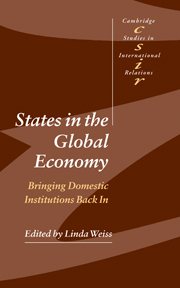Book contents
- Frontmatter
- Contents
- List of figures
- List of tables
- List of contributors
- Preface
- 1 Introduction: bringing domestic institutions back in
- Part I The resilience of welfare states
- Part II New economic challenges, changing state capacities
- Part III Governing globalisation
- List of references
- Index
- CAMBRIDGE STUDIES IN INTERNATIONAL RELATIONS
1 - Introduction: bringing domestic institutions back in
Published online by Cambridge University Press: 22 September 2009
- Frontmatter
- Contents
- List of figures
- List of tables
- List of contributors
- Preface
- 1 Introduction: bringing domestic institutions back in
- Part I The resilience of welfare states
- Part II New economic challenges, changing state capacities
- Part III Governing globalisation
- List of references
- Index
- CAMBRIDGE STUDIES IN INTERNATIONAL RELATIONS
Summary
An issue of central importance in the globalisation debate today concerns the impact of increasing economic openness upon the state's capacity to govern the national economy. As participants in that debate, we seek answers to the big questions, such as whether, in a world of highly mobile capital, states – as territorially centred authorities – are still vital to the social and economic well-being of their citizens. We want to know what, if anything, states can do to promote wealth creation and social protection in an era of economic interdependence. And we want to know whether countries which travel the path of international economic openness must necessarily abandon their distinctive institutions (and embrace the norms, arrangements, and policies of competitive liberalism).
These are not idle questions. The reason we are asking such questions so insistently at the turn of the century has much to do with the widespread changes going on both inside and outside the nation-state – ranging from welfare reforms, through financial liberalisation, to the proliferation of intergovernmental agreements.
These organisational and regulatory reforms appear to be coinciding with other changes taking place in the structure of the international political economy – in particular, the multinationalisation of production and the growth of so-called ‘footloose’, business corporations, as well as the astonishing increase and speed of cross-border capital flows.
- Type
- Chapter
- Information
- States in the Global EconomyBringing Domestic Institutions Back In, pp. 1 - 34Publisher: Cambridge University PressPrint publication year: 2003
- 28
- Cited by



